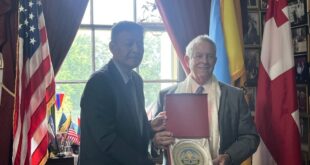WASHINGTON, D.C. – Today Reps. James P. McGovern (D-MA) and Christopher H. Smith (R-NJ) released a bipartisan letter to Secretary of State Mike Pompeo, signed by 32 Members of Congress, urging the Trump Administration to promptly implement key legislation passed by Congress to guide United States policy on Tibet.
Independent reporting confirms that repression of fundamental human rights continues in Tibet. In its latest Freedom in the World report, Freedom House ranked Tibet as among the least free places in the world, in the company of countries like Syria, South Sudan, Eritrea, Turkmenistan and North Korea.
Congress has passed legislation to address the lack of respect for human rights in Tibet. The Tibet Policy Act of 2002 urges the president of the United States to encourage direct dialogue between the government of the People’s Republic of China and representatives of His Holiness the Dalai Lama. The 2018 Reciprocal Access to Tibet Act requires the State Department to monitor the access that American diplomats, journalists and citizens are granted to Tibetan areas of China. Chinese officials identified as responsible for restricting access become ineligible for admission to the United States. The letter urges robust implementation of both laws.
“Strong support for human rights must always underlie America’s relationship with the government of China. There is a strong, bipartisan, and growing majority in Congress that is deeply concerned about the situation in Tibet, and we encourage President Trump and Secretary Pompeo to join us by fully implementing both the Tibet Policy Act and the Reciprocal Access to Tibet Act,” said Congressman McGovern.
“Members of Congress and the Administration must affirm the peaceful desires of the Tibetan people for greater autonomy and freedom within China,” said Congressman Smith. “We should demand open access to Tibet by journalists and diplomats, and we should raise the cases of prisoners of conscience with Chinese officials. Congress passed the Tibet Policy Act of 2002 and the 2018 Reciprocal Access to Tibet Act to advance religious and political freedom in Tibet, and the Administration must act to fully implement these laws. U.S. leadership on these issues is critical, and we must demonstrate that universally-recognized human rights, especially religious freedom, matter everywhere – especially in Tibet.”
The full text of the letter is reprinted below. A scanned copy of the signed letter is available here.
Dear Secretary Pompeo,
We write today to express our deep concern about the well-being of the Tibetan people under Chinese rule and to call on you to promptly implement key legislation that Congress has passed to guide United States policy on Tibet.
Recently, Tibet was closed off to all foreigners, as Tibetans all over the world marked the 60th anniversary of the Tibetan Uprising, the forced exile of His Holiness the Dalai Lama, and the exodus of tens of thousands of refugees who have been unable to return to their homeland.
Today, the repression in Tibet continues unabated. In its latest Freedom in the World report, Freedom House ranked Tibet as among the least free places in the world, in the company of Syria, North Korea and South Sudan. Tibetan Buddhists are denied their religious freedom, as all religious affairs are under the oppressive control of the Chinese Communist Party.
It is therefore now more urgent than ever that the State Department fully implement current law on Tibet.
The Tibetan Policy Act (TPA) of 2002 calls for the appointment of a Special Coordinator for Tibetan Issues at the State Department to facilitate coordination of U.S. policy toward Tibet. This position, previously designated at the level of Under Secretary of State, has remained vacant since the beginning of the current administration. We urge you to appoint a Special Coordinator of appropriate rank as soon as possible.
The TPA also calls on the President and Secretary to “encourage the Government of the People’s Republic of China to enter into a dialogue with the Dalai Lama or his representatives leading to a negotiated agreement on Tibet.” We call on you and the President to publicly raise this issue and address the lack of respect for human rights in Tibet during all your meetings with senior Chinese government officials.
In 2018, the Congress passed the Reciprocal Access to Tibet Act (RATA), which responds to the lack of access to Tibet for American citizens by reinforcing the principle of reciprocity as a central aspect of U.S.-China relations. RATA requires the State Department to report to Congress on the level of access that U.S. diplomats, journalists and American citizens are granted to Tibetan areas of China, and to provide a list of the Chinese officials who formulate or execute policies to restrict access to Tibet, who then become ineligible to receive a visa or be admitted to the United States. Robust implementation of RATA would send a strong signal both to Beijing and to the international community that the Chinese government’s discriminatory practices regarding access to Tibetan areas should not and will not be tolerated.
We look forward to working with you on this very important moral issue of our time, which greatly concerns Members of Congress and the American people.
Sincerely,
Members of Congress
-This news was released by Tom Lantos Human Rights Commission




